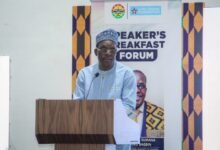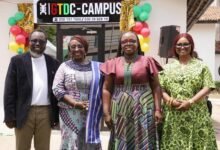2 organisations provide farming c’nity with borehole, library

Ekowso, a farming community in the Kwahu West Municipality in the Eastern Region, have been given a solar-powered mechanised borehole water facility and a 40-seater community library by two separate non-profit making organisations, Project Maji Foundation and Reading Spots.
The water facility built by Project Maji would supply the communities with about 1,000 liters of potable drinking water daily.
In her speech, the Communications Director, Ms Rosemary Irons, said the project aims to empower women in the local communities, improve water quality and eliminate water borne diseases from the use of contaminated water.
She said the project would relieve children and school kids travelling long hours and distances to fetch water before and after school.
Ms Irons added that more of the water projects are scheduled to be extended to very deprived communities across the country in order to promote healthy life among Ghanaians.
She indicated that universal access to safe drinking water is a fundamental need to human right, adding that Project Maji is working to bring clean water to the rural populations across sub-Saharan African.
“Our target is to reach one million Ghanaians in 1,000 sites by 2025”, Ms Iron disclosed.
Project Maji, established in 2015, has provided over 15,000 Ghanaians access to safe drinking water using a new technology called Solar Water Kiosk.
For her part, the Director of Service and Social Impact and a teacher of Sevenoaks School in the United Kingdom, Ms Cat Davison, said the library facility was to empower pupils with knowledge, understanding and mindset to drive positive social change among Ghanaians.
She said Reading Spots, formed out of Sevenoak School is a UK registered project creating community-led solar-powered sustainable libraries in rural Ghana through global citizenship education projects.
Ms Davison said her outfit believed investment in reading resources, and also offering a flexible place for community education, will greatly improve literacy in rural communities in Ghana, where some figures suggest over 50% of adults are illiterate.
She added that access to books in rural areas of Ghana have proved to be extremely limited, stating that very few schools have a functioning library, especially at the primary and junior levels.
“It is our belief that this will in turn improve leaving standards, with increased understanding about health, further opportunities for employment, and the increased likelihood that pupils will be able to progress onto secondary school”, Ms Davison said.
She therefore advised the residents to exhibit a good maintenance culture so as to enhance the lasting of the facilities.
FROM DAVID KODJO, EKOWSO







